BUS804: Alibaba Group's Strategies for International Expansion
VerifiedAdded on 2023/06/07
|11
|2990
|291
Report
AI Summary
This report analyzes Alibaba Group's strategies for conducting business in China and its plans for international expansion. It discusses Alibaba's business model, focusing on its e-commerce platforms like Alibaba, TMall, and Taobao, and how it leverages commission-based revenue. The report outlines the five stages of Alibaba's growth in the Chinese market, highlighting its competitive pricing strategy and conglomerate diversification. It also examines the reasons for Alibaba's success in China, including its unique profit model, accurate credit system, and excellent customer support. Furthermore, the report explores Alibaba's strategies for replicating its China model overseas, aiming for significant international market penetration and competitive advantages in the global e-commerce landscape through an integrated ecosystem and diversified services. The feasibility of applying the China strategy to overseas markets is also assessed, considering economic and operational factors.
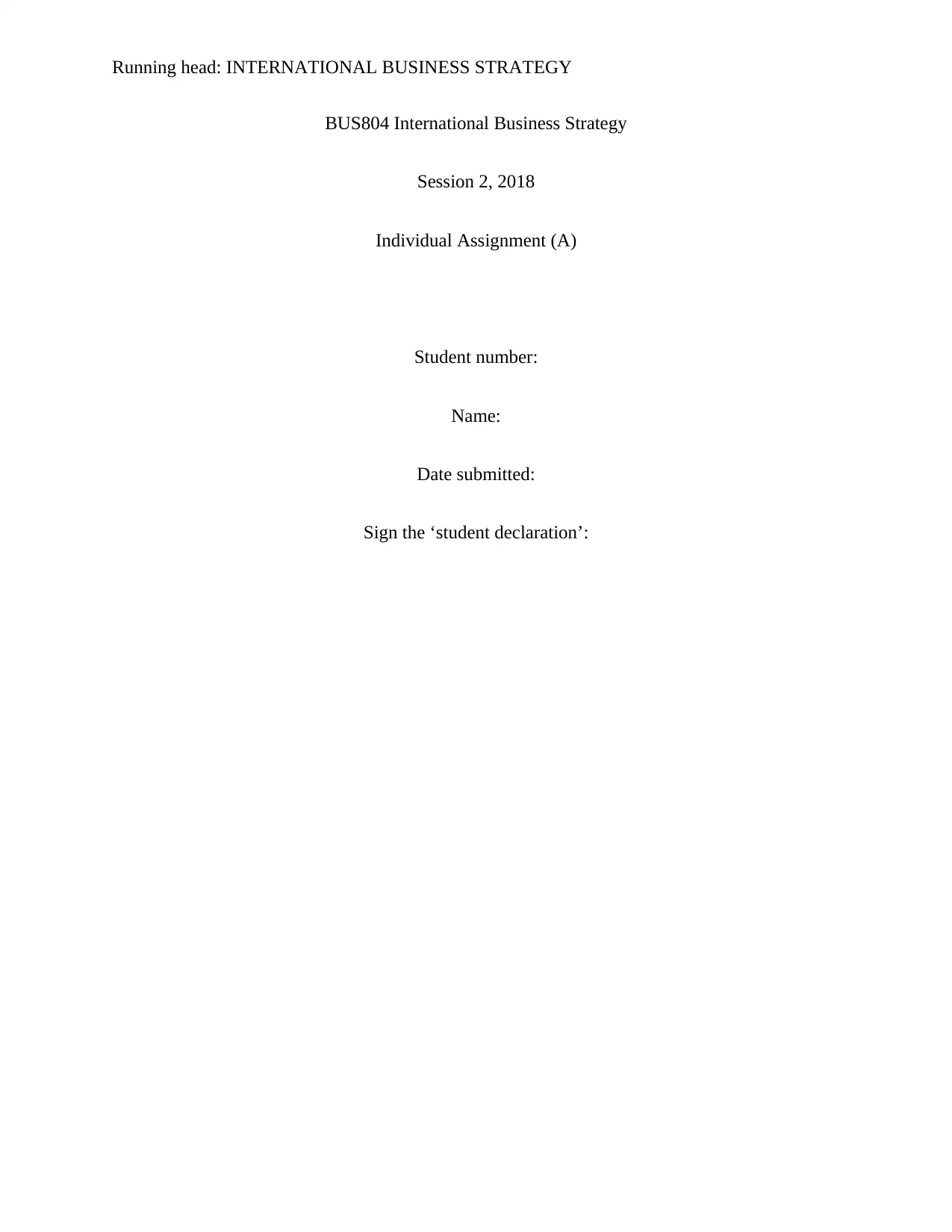
Running head: INTERNATIONAL BUSINESS STRATEGY
BUS804 International Business Strategy
Session 2, 2018
Individual Assignment (A)
Student number:
Name:
Date submitted:
Sign the ‘student declaration’:
BUS804 International Business Strategy
Session 2, 2018
Individual Assignment (A)
Student number:
Name:
Date submitted:
Sign the ‘student declaration’:
Paraphrase This Document
Need a fresh take? Get an instant paraphrase of this document with our AI Paraphraser
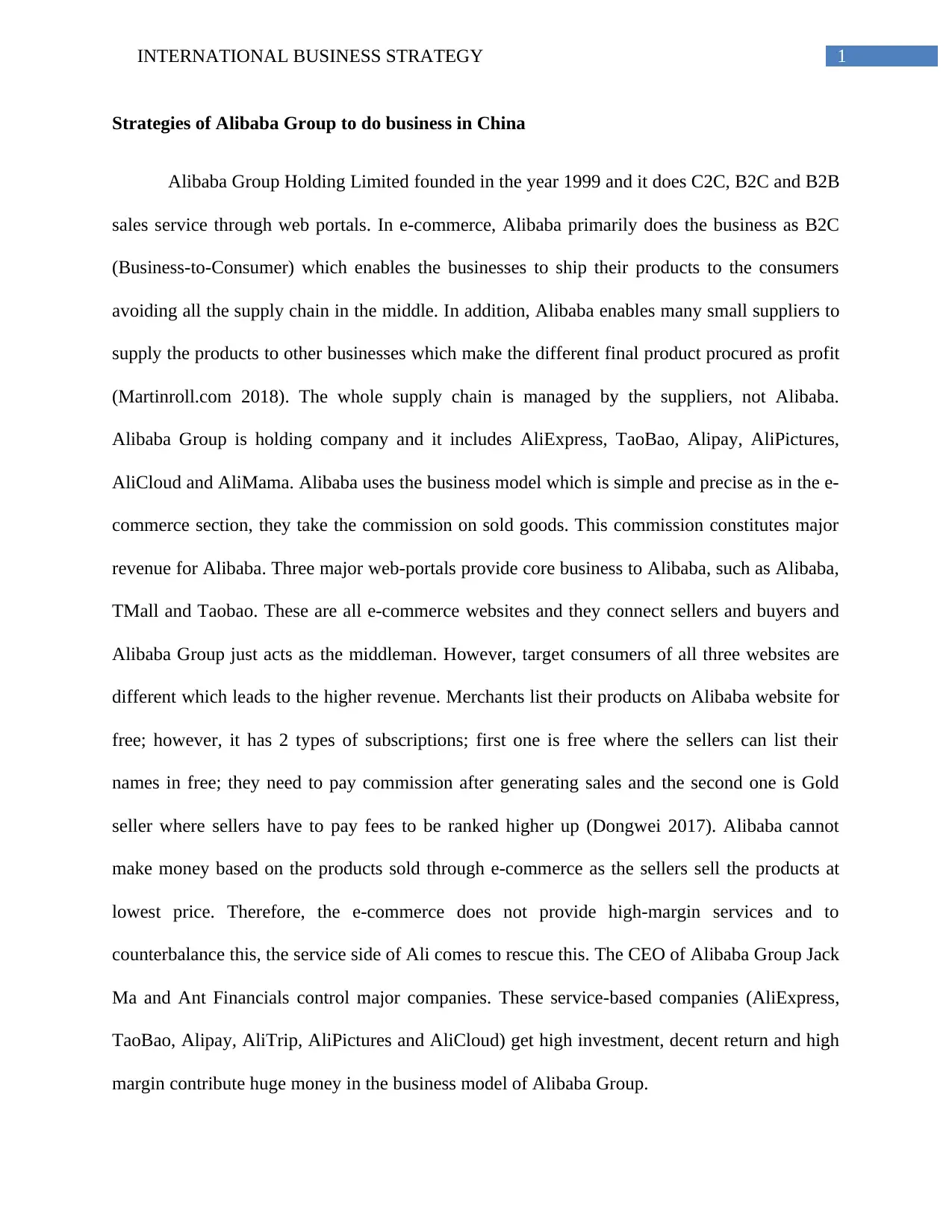
1INTERNATIONAL BUSINESS STRATEGY
Strategies of Alibaba Group to do business in China
Alibaba Group Holding Limited founded in the year 1999 and it does C2C, B2C and B2B
sales service through web portals. In e-commerce, Alibaba primarily does the business as B2C
(Business-to-Consumer) which enables the businesses to ship their products to the consumers
avoiding all the supply chain in the middle. In addition, Alibaba enables many small suppliers to
supply the products to other businesses which make the different final product procured as profit
(Martinroll.com 2018). The whole supply chain is managed by the suppliers, not Alibaba.
Alibaba Group is holding company and it includes AliExpress, TaoBao, Alipay, AliPictures,
AliCloud and AliMama. Alibaba uses the business model which is simple and precise as in the e-
commerce section, they take the commission on sold goods. This commission constitutes major
revenue for Alibaba. Three major web-portals provide core business to Alibaba, such as Alibaba,
TMall and Taobao. These are all e-commerce websites and they connect sellers and buyers and
Alibaba Group just acts as the middleman. However, target consumers of all three websites are
different which leads to the higher revenue. Merchants list their products on Alibaba website for
free; however, it has 2 types of subscriptions; first one is free where the sellers can list their
names in free; they need to pay commission after generating sales and the second one is Gold
seller where sellers have to pay fees to be ranked higher up (Dongwei 2017). Alibaba cannot
make money based on the products sold through e-commerce as the sellers sell the products at
lowest price. Therefore, the e-commerce does not provide high-margin services and to
counterbalance this, the service side of Ali comes to rescue this. The CEO of Alibaba Group Jack
Ma and Ant Financials control major companies. These service-based companies (AliExpress,
TaoBao, Alipay, AliTrip, AliPictures and AliCloud) get high investment, decent return and high
margin contribute huge money in the business model of Alibaba Group.
Strategies of Alibaba Group to do business in China
Alibaba Group Holding Limited founded in the year 1999 and it does C2C, B2C and B2B
sales service through web portals. In e-commerce, Alibaba primarily does the business as B2C
(Business-to-Consumer) which enables the businesses to ship their products to the consumers
avoiding all the supply chain in the middle. In addition, Alibaba enables many small suppliers to
supply the products to other businesses which make the different final product procured as profit
(Martinroll.com 2018). The whole supply chain is managed by the suppliers, not Alibaba.
Alibaba Group is holding company and it includes AliExpress, TaoBao, Alipay, AliPictures,
AliCloud and AliMama. Alibaba uses the business model which is simple and precise as in the e-
commerce section, they take the commission on sold goods. This commission constitutes major
revenue for Alibaba. Three major web-portals provide core business to Alibaba, such as Alibaba,
TMall and Taobao. These are all e-commerce websites and they connect sellers and buyers and
Alibaba Group just acts as the middleman. However, target consumers of all three websites are
different which leads to the higher revenue. Merchants list their products on Alibaba website for
free; however, it has 2 types of subscriptions; first one is free where the sellers can list their
names in free; they need to pay commission after generating sales and the second one is Gold
seller where sellers have to pay fees to be ranked higher up (Dongwei 2017). Alibaba cannot
make money based on the products sold through e-commerce as the sellers sell the products at
lowest price. Therefore, the e-commerce does not provide high-margin services and to
counterbalance this, the service side of Ali comes to rescue this. The CEO of Alibaba Group Jack
Ma and Ant Financials control major companies. These service-based companies (AliExpress,
TaoBao, Alipay, AliTrip, AliPictures and AliCloud) get high investment, decent return and high
margin contribute huge money in the business model of Alibaba Group.
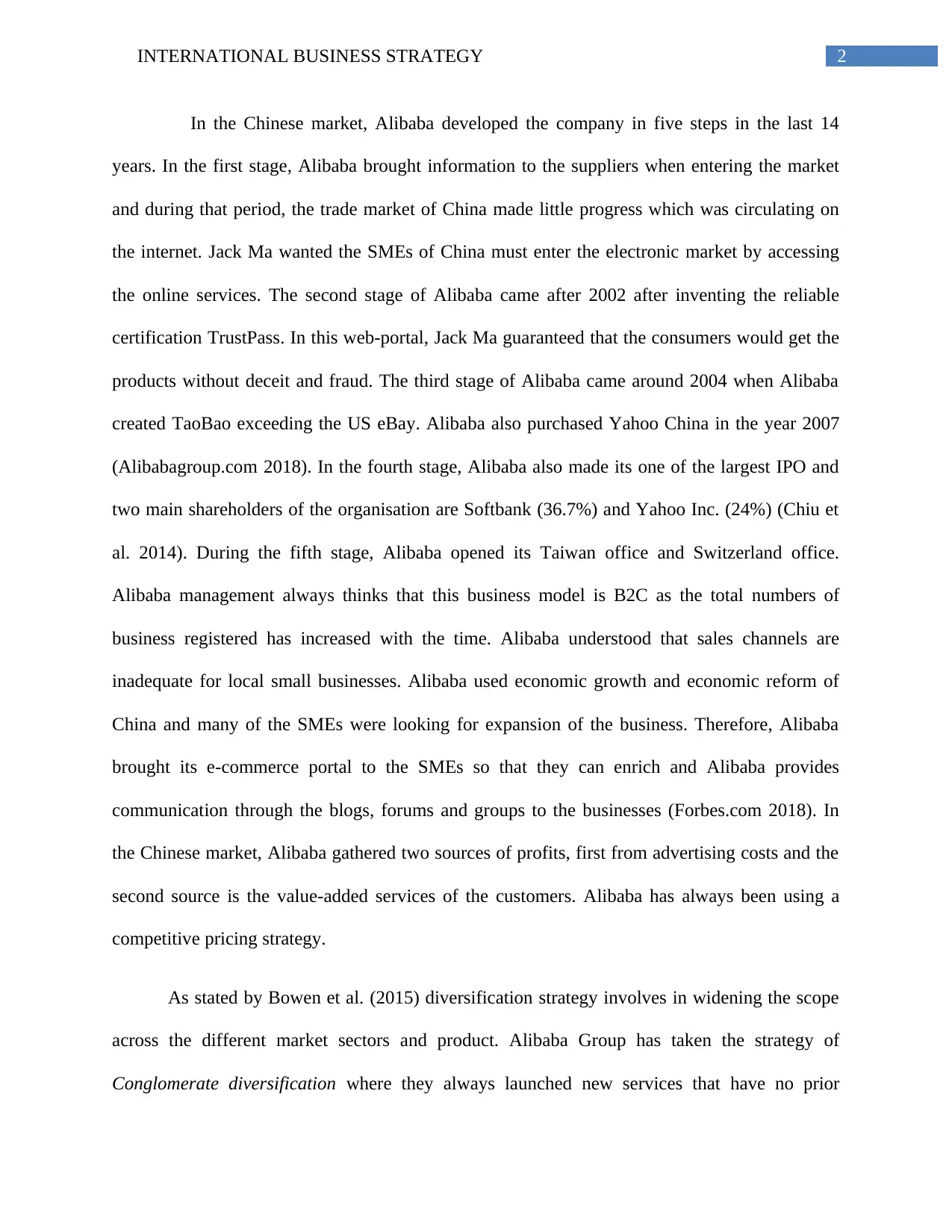
2INTERNATIONAL BUSINESS STRATEGY
In the Chinese market, Alibaba developed the company in five steps in the last 14
years. In the first stage, Alibaba brought information to the suppliers when entering the market
and during that period, the trade market of China made little progress which was circulating on
the internet. Jack Ma wanted the SMEs of China must enter the electronic market by accessing
the online services. The second stage of Alibaba came after 2002 after inventing the reliable
certification TrustPass. In this web-portal, Jack Ma guaranteed that the consumers would get the
products without deceit and fraud. The third stage of Alibaba came around 2004 when Alibaba
created TaoBao exceeding the US eBay. Alibaba also purchased Yahoo China in the year 2007
(Alibabagroup.com 2018). In the fourth stage, Alibaba also made its one of the largest IPO and
two main shareholders of the organisation are Softbank (36.7%) and Yahoo Inc. (24%) (Chiu et
al. 2014). During the fifth stage, Alibaba opened its Taiwan office and Switzerland office.
Alibaba management always thinks that this business model is B2C as the total numbers of
business registered has increased with the time. Alibaba understood that sales channels are
inadequate for local small businesses. Alibaba used economic growth and economic reform of
China and many of the SMEs were looking for expansion of the business. Therefore, Alibaba
brought its e-commerce portal to the SMEs so that they can enrich and Alibaba provides
communication through the blogs, forums and groups to the businesses (Forbes.com 2018). In
the Chinese market, Alibaba gathered two sources of profits, first from advertising costs and the
second source is the value-added services of the customers. Alibaba has always been using a
competitive pricing strategy.
As stated by Bowen et al. (2015) diversification strategy involves in widening the scope
across the different market sectors and product. Alibaba Group has taken the strategy of
Conglomerate diversification where they always launched new services that have no prior
In the Chinese market, Alibaba developed the company in five steps in the last 14
years. In the first stage, Alibaba brought information to the suppliers when entering the market
and during that period, the trade market of China made little progress which was circulating on
the internet. Jack Ma wanted the SMEs of China must enter the electronic market by accessing
the online services. The second stage of Alibaba came after 2002 after inventing the reliable
certification TrustPass. In this web-portal, Jack Ma guaranteed that the consumers would get the
products without deceit and fraud. The third stage of Alibaba came around 2004 when Alibaba
created TaoBao exceeding the US eBay. Alibaba also purchased Yahoo China in the year 2007
(Alibabagroup.com 2018). In the fourth stage, Alibaba also made its one of the largest IPO and
two main shareholders of the organisation are Softbank (36.7%) and Yahoo Inc. (24%) (Chiu et
al. 2014). During the fifth stage, Alibaba opened its Taiwan office and Switzerland office.
Alibaba management always thinks that this business model is B2C as the total numbers of
business registered has increased with the time. Alibaba understood that sales channels are
inadequate for local small businesses. Alibaba used economic growth and economic reform of
China and many of the SMEs were looking for expansion of the business. Therefore, Alibaba
brought its e-commerce portal to the SMEs so that they can enrich and Alibaba provides
communication through the blogs, forums and groups to the businesses (Forbes.com 2018). In
the Chinese market, Alibaba gathered two sources of profits, first from advertising costs and the
second source is the value-added services of the customers. Alibaba has always been using a
competitive pricing strategy.
As stated by Bowen et al. (2015) diversification strategy involves in widening the scope
across the different market sectors and product. Alibaba Group has taken the strategy of
Conglomerate diversification where they always launched new services that have no prior
⊘ This is a preview!⊘
Do you want full access?
Subscribe today to unlock all pages.

Trusted by 1+ million students worldwide
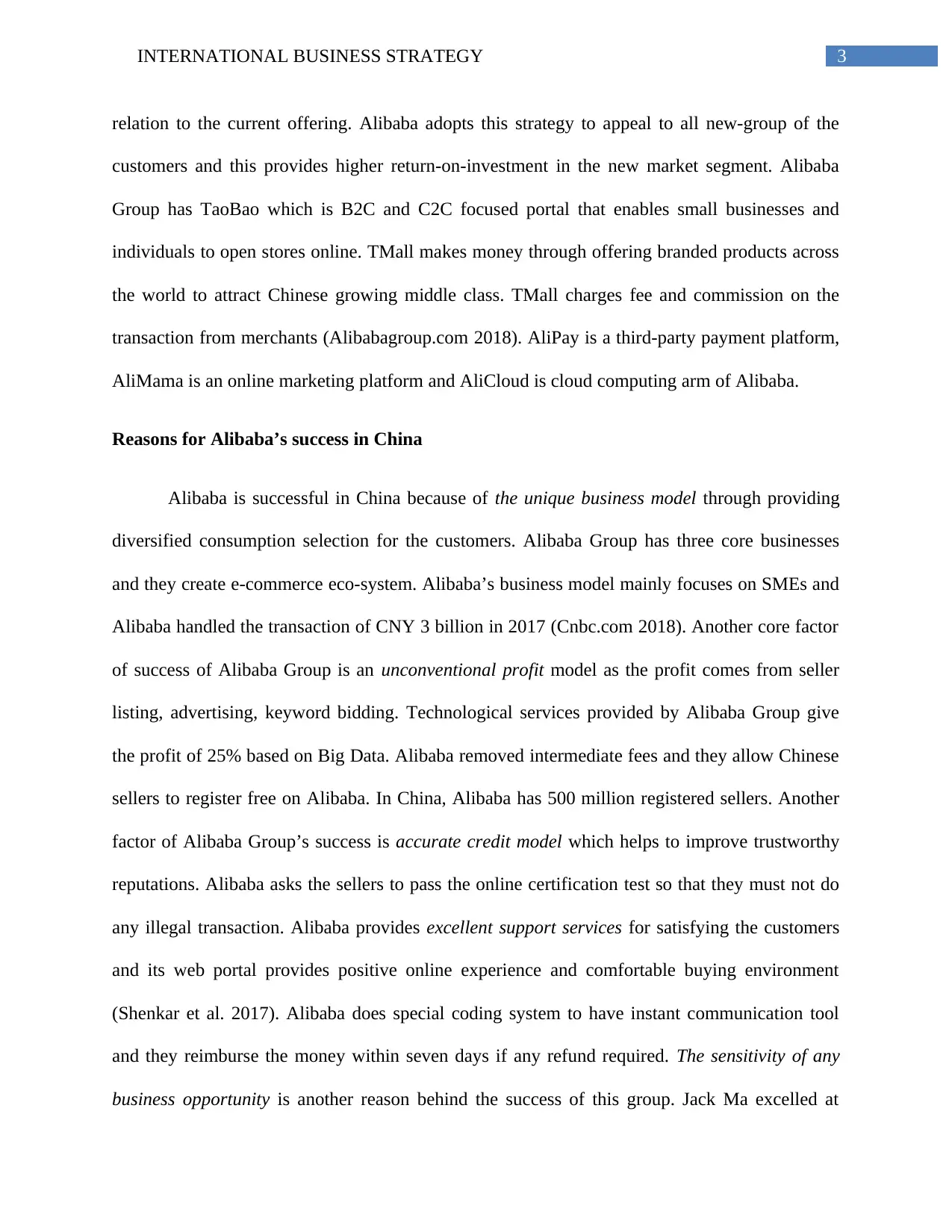
3INTERNATIONAL BUSINESS STRATEGY
relation to the current offering. Alibaba adopts this strategy to appeal to all new-group of the
customers and this provides higher return-on-investment in the new market segment. Alibaba
Group has TaoBao which is B2C and C2C focused portal that enables small businesses and
individuals to open stores online. TMall makes money through offering branded products across
the world to attract Chinese growing middle class. TMall charges fee and commission on the
transaction from merchants (Alibabagroup.com 2018). AliPay is a third-party payment platform,
AliMama is an online marketing platform and AliCloud is cloud computing arm of Alibaba.
Reasons for Alibaba’s success in China
Alibaba is successful in China because of the unique business model through providing
diversified consumption selection for the customers. Alibaba Group has three core businesses
and they create e-commerce eco-system. Alibaba’s business model mainly focuses on SMEs and
Alibaba handled the transaction of CNY 3 billion in 2017 (Cnbc.com 2018). Another core factor
of success of Alibaba Group is an unconventional profit model as the profit comes from seller
listing, advertising, keyword bidding. Technological services provided by Alibaba Group give
the profit of 25% based on Big Data. Alibaba removed intermediate fees and they allow Chinese
sellers to register free on Alibaba. In China, Alibaba has 500 million registered sellers. Another
factor of Alibaba Group’s success is accurate credit model which helps to improve trustworthy
reputations. Alibaba asks the sellers to pass the online certification test so that they must not do
any illegal transaction. Alibaba provides excellent support services for satisfying the customers
and its web portal provides positive online experience and comfortable buying environment
(Shenkar et al. 2017). Alibaba does special coding system to have instant communication tool
and they reimburse the money within seven days if any refund required. The sensitivity of any
business opportunity is another reason behind the success of this group. Jack Ma excelled at
relation to the current offering. Alibaba adopts this strategy to appeal to all new-group of the
customers and this provides higher return-on-investment in the new market segment. Alibaba
Group has TaoBao which is B2C and C2C focused portal that enables small businesses and
individuals to open stores online. TMall makes money through offering branded products across
the world to attract Chinese growing middle class. TMall charges fee and commission on the
transaction from merchants (Alibabagroup.com 2018). AliPay is a third-party payment platform,
AliMama is an online marketing platform and AliCloud is cloud computing arm of Alibaba.
Reasons for Alibaba’s success in China
Alibaba is successful in China because of the unique business model through providing
diversified consumption selection for the customers. Alibaba Group has three core businesses
and they create e-commerce eco-system. Alibaba’s business model mainly focuses on SMEs and
Alibaba handled the transaction of CNY 3 billion in 2017 (Cnbc.com 2018). Another core factor
of success of Alibaba Group is an unconventional profit model as the profit comes from seller
listing, advertising, keyword bidding. Technological services provided by Alibaba Group give
the profit of 25% based on Big Data. Alibaba removed intermediate fees and they allow Chinese
sellers to register free on Alibaba. In China, Alibaba has 500 million registered sellers. Another
factor of Alibaba Group’s success is accurate credit model which helps to improve trustworthy
reputations. Alibaba asks the sellers to pass the online certification test so that they must not do
any illegal transaction. Alibaba provides excellent support services for satisfying the customers
and its web portal provides positive online experience and comfortable buying environment
(Shenkar et al. 2017). Alibaba does special coding system to have instant communication tool
and they reimburse the money within seven days if any refund required. The sensitivity of any
business opportunity is another reason behind the success of this group. Jack Ma excelled at
Paraphrase This Document
Need a fresh take? Get an instant paraphrase of this document with our AI Paraphraser
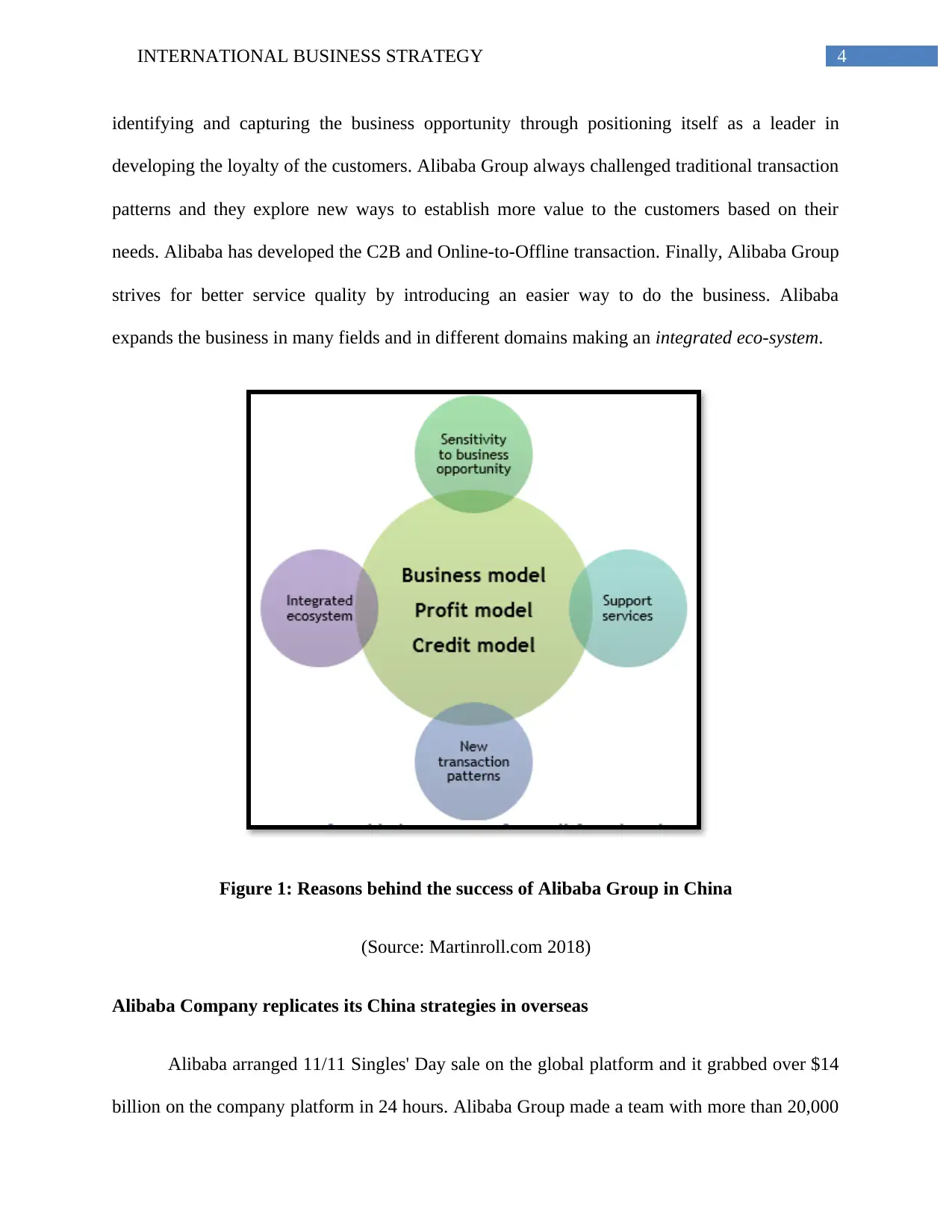
4INTERNATIONAL BUSINESS STRATEGY
identifying and capturing the business opportunity through positioning itself as a leader in
developing the loyalty of the customers. Alibaba Group always challenged traditional transaction
patterns and they explore new ways to establish more value to the customers based on their
needs. Alibaba has developed the C2B and Online-to-Offline transaction. Finally, Alibaba Group
strives for better service quality by introducing an easier way to do the business. Alibaba
expands the business in many fields and in different domains making an integrated eco-system.
Figure 1: Reasons behind the success of Alibaba Group in China
(Source: Martinroll.com 2018)
Alibaba Company replicates its China strategies in overseas
Alibaba arranged 11/11 Singles' Day sale on the global platform and it grabbed over $14
billion on the company platform in 24 hours. Alibaba Group made a team with more than 20,000
identifying and capturing the business opportunity through positioning itself as a leader in
developing the loyalty of the customers. Alibaba Group always challenged traditional transaction
patterns and they explore new ways to establish more value to the customers based on their
needs. Alibaba has developed the C2B and Online-to-Offline transaction. Finally, Alibaba Group
strives for better service quality by introducing an easier way to do the business. Alibaba
expands the business in many fields and in different domains making an integrated eco-system.
Figure 1: Reasons behind the success of Alibaba Group in China
(Source: Martinroll.com 2018)
Alibaba Company replicates its China strategies in overseas
Alibaba arranged 11/11 Singles' Day sale on the global platform and it grabbed over $14
billion on the company platform in 24 hours. Alibaba Group made a team with more than 20,000
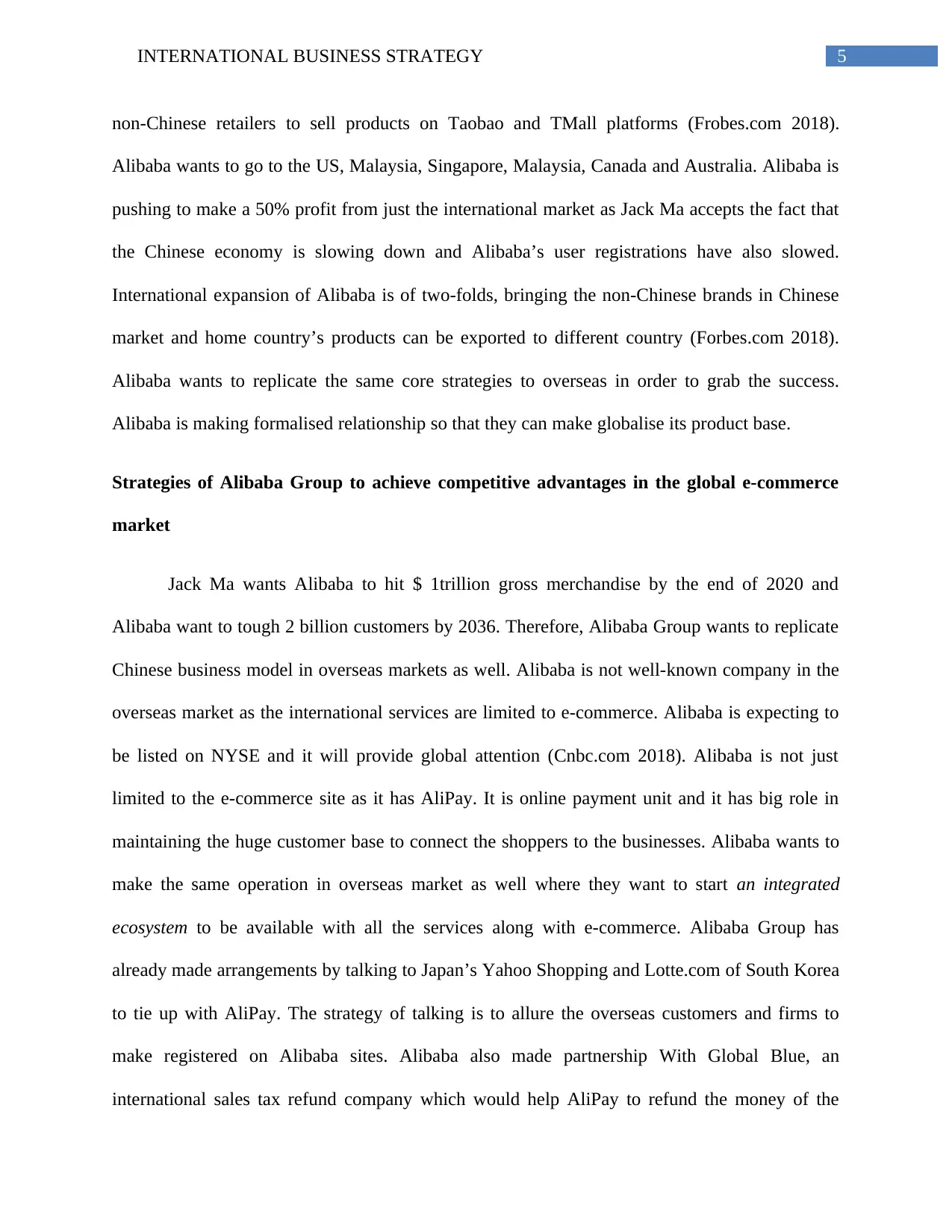
5INTERNATIONAL BUSINESS STRATEGY
non-Chinese retailers to sell products on Taobao and TMall platforms (Frobes.com 2018).
Alibaba wants to go to the US, Malaysia, Singapore, Malaysia, Canada and Australia. Alibaba is
pushing to make a 50% profit from just the international market as Jack Ma accepts the fact that
the Chinese economy is slowing down and Alibaba’s user registrations have also slowed.
International expansion of Alibaba is of two-folds, bringing the non-Chinese brands in Chinese
market and home country’s products can be exported to different country (Forbes.com 2018).
Alibaba wants to replicate the same core strategies to overseas in order to grab the success.
Alibaba is making formalised relationship so that they can make globalise its product base.
Strategies of Alibaba Group to achieve competitive advantages in the global e-commerce
market
Jack Ma wants Alibaba to hit $ 1trillion gross merchandise by the end of 2020 and
Alibaba want to tough 2 billion customers by 2036. Therefore, Alibaba Group wants to replicate
Chinese business model in overseas markets as well. Alibaba is not well-known company in the
overseas market as the international services are limited to e-commerce. Alibaba is expecting to
be listed on NYSE and it will provide global attention (Cnbc.com 2018). Alibaba is not just
limited to the e-commerce site as it has AliPay. It is online payment unit and it has big role in
maintaining the huge customer base to connect the shoppers to the businesses. Alibaba wants to
make the same operation in overseas market as well where they want to start an integrated
ecosystem to be available with all the services along with e-commerce. Alibaba Group has
already made arrangements by talking to Japan’s Yahoo Shopping and Lotte.com of South Korea
to tie up with AliPay. The strategy of talking is to allure the overseas customers and firms to
make registered on Alibaba sites. Alibaba also made partnership With Global Blue, an
international sales tax refund company which would help AliPay to refund the money of the
non-Chinese retailers to sell products on Taobao and TMall platforms (Frobes.com 2018).
Alibaba wants to go to the US, Malaysia, Singapore, Malaysia, Canada and Australia. Alibaba is
pushing to make a 50% profit from just the international market as Jack Ma accepts the fact that
the Chinese economy is slowing down and Alibaba’s user registrations have also slowed.
International expansion of Alibaba is of two-folds, bringing the non-Chinese brands in Chinese
market and home country’s products can be exported to different country (Forbes.com 2018).
Alibaba wants to replicate the same core strategies to overseas in order to grab the success.
Alibaba is making formalised relationship so that they can make globalise its product base.
Strategies of Alibaba Group to achieve competitive advantages in the global e-commerce
market
Jack Ma wants Alibaba to hit $ 1trillion gross merchandise by the end of 2020 and
Alibaba want to tough 2 billion customers by 2036. Therefore, Alibaba Group wants to replicate
Chinese business model in overseas markets as well. Alibaba is not well-known company in the
overseas market as the international services are limited to e-commerce. Alibaba is expecting to
be listed on NYSE and it will provide global attention (Cnbc.com 2018). Alibaba is not just
limited to the e-commerce site as it has AliPay. It is online payment unit and it has big role in
maintaining the huge customer base to connect the shoppers to the businesses. Alibaba wants to
make the same operation in overseas market as well where they want to start an integrated
ecosystem to be available with all the services along with e-commerce. Alibaba Group has
already made arrangements by talking to Japan’s Yahoo Shopping and Lotte.com of South Korea
to tie up with AliPay. The strategy of talking is to allure the overseas customers and firms to
make registered on Alibaba sites. Alibaba also made partnership With Global Blue, an
international sales tax refund company which would help AliPay to refund the money of the
⊘ This is a preview!⊘
Do you want full access?
Subscribe today to unlock all pages.

Trusted by 1+ million students worldwide
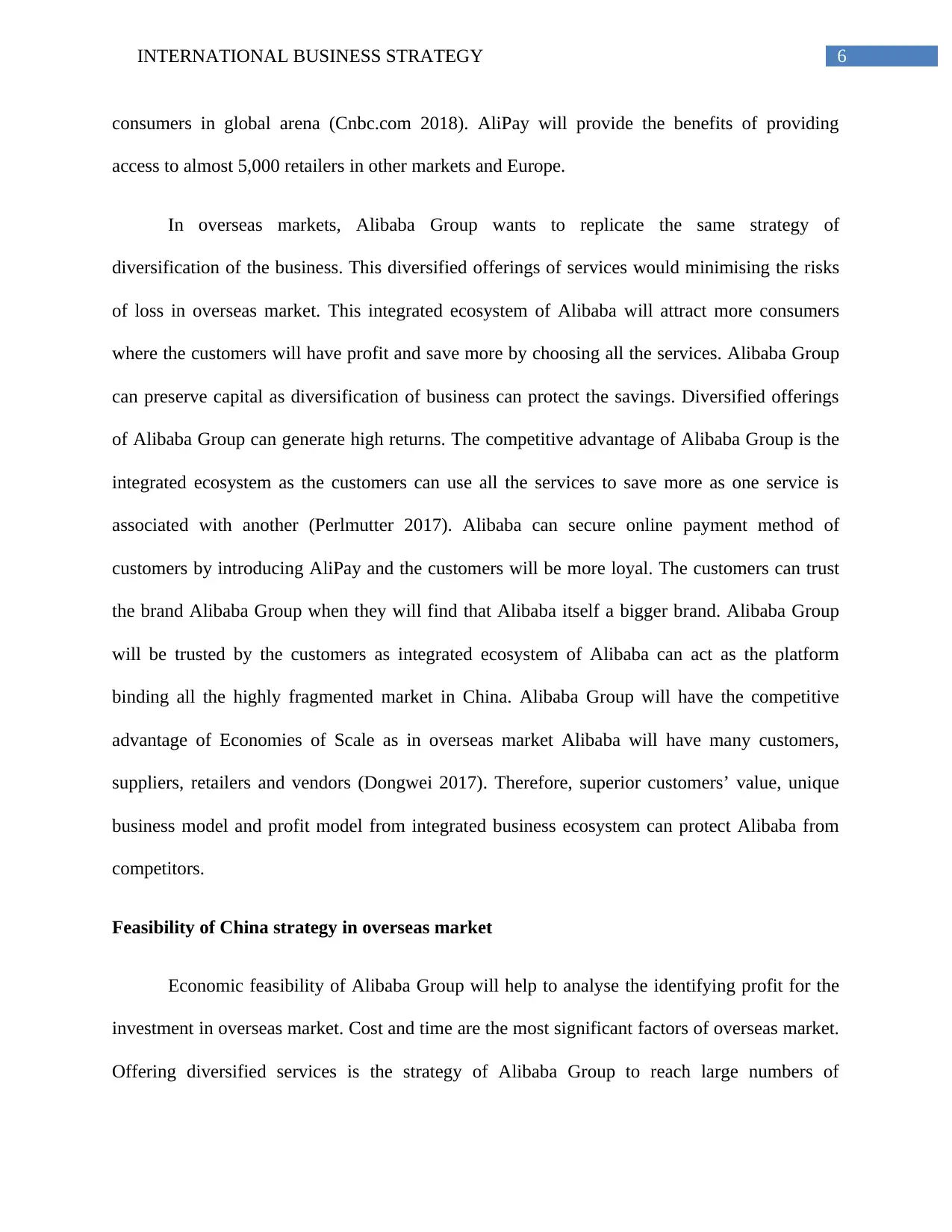
6INTERNATIONAL BUSINESS STRATEGY
consumers in global arena (Cnbc.com 2018). AliPay will provide the benefits of providing
access to almost 5,000 retailers in other markets and Europe.
In overseas markets, Alibaba Group wants to replicate the same strategy of
diversification of the business. This diversified offerings of services would minimising the risks
of loss in overseas market. This integrated ecosystem of Alibaba will attract more consumers
where the customers will have profit and save more by choosing all the services. Alibaba Group
can preserve capital as diversification of business can protect the savings. Diversified offerings
of Alibaba Group can generate high returns. The competitive advantage of Alibaba Group is the
integrated ecosystem as the customers can use all the services to save more as one service is
associated with another (Perlmutter 2017). Alibaba can secure online payment method of
customers by introducing AliPay and the customers will be more loyal. The customers can trust
the brand Alibaba Group when they will find that Alibaba itself a bigger brand. Alibaba Group
will be trusted by the customers as integrated ecosystem of Alibaba can act as the platform
binding all the highly fragmented market in China. Alibaba Group will have the competitive
advantage of Economies of Scale as in overseas market Alibaba will have many customers,
suppliers, retailers and vendors (Dongwei 2017). Therefore, superior customers’ value, unique
business model and profit model from integrated business ecosystem can protect Alibaba from
competitors.
Feasibility of China strategy in overseas market
Economic feasibility of Alibaba Group will help to analyse the identifying profit for the
investment in overseas market. Cost and time are the most significant factors of overseas market.
Offering diversified services is the strategy of Alibaba Group to reach large numbers of
consumers in global arena (Cnbc.com 2018). AliPay will provide the benefits of providing
access to almost 5,000 retailers in other markets and Europe.
In overseas markets, Alibaba Group wants to replicate the same strategy of
diversification of the business. This diversified offerings of services would minimising the risks
of loss in overseas market. This integrated ecosystem of Alibaba will attract more consumers
where the customers will have profit and save more by choosing all the services. Alibaba Group
can preserve capital as diversification of business can protect the savings. Diversified offerings
of Alibaba Group can generate high returns. The competitive advantage of Alibaba Group is the
integrated ecosystem as the customers can use all the services to save more as one service is
associated with another (Perlmutter 2017). Alibaba can secure online payment method of
customers by introducing AliPay and the customers will be more loyal. The customers can trust
the brand Alibaba Group when they will find that Alibaba itself a bigger brand. Alibaba Group
will be trusted by the customers as integrated ecosystem of Alibaba can act as the platform
binding all the highly fragmented market in China. Alibaba Group will have the competitive
advantage of Economies of Scale as in overseas market Alibaba will have many customers,
suppliers, retailers and vendors (Dongwei 2017). Therefore, superior customers’ value, unique
business model and profit model from integrated business ecosystem can protect Alibaba from
competitors.
Feasibility of China strategy in overseas market
Economic feasibility of Alibaba Group will help to analyse the identifying profit for the
investment in overseas market. Cost and time are the most significant factors of overseas market.
Offering diversified services is the strategy of Alibaba Group to reach large numbers of
Paraphrase This Document
Need a fresh take? Get an instant paraphrase of this document with our AI Paraphraser
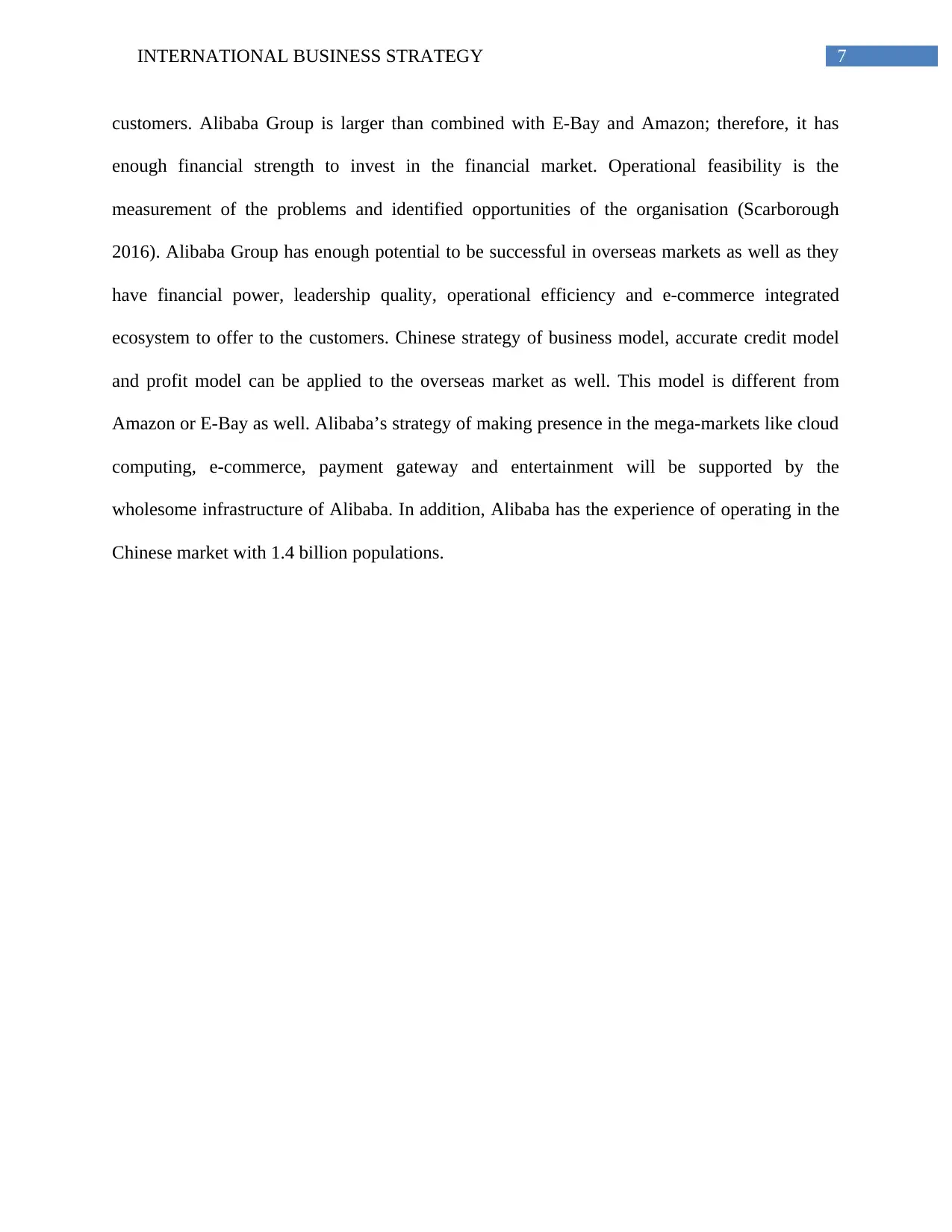
7INTERNATIONAL BUSINESS STRATEGY
customers. Alibaba Group is larger than combined with E-Bay and Amazon; therefore, it has
enough financial strength to invest in the financial market. Operational feasibility is the
measurement of the problems and identified opportunities of the organisation (Scarborough
2016). Alibaba Group has enough potential to be successful in overseas markets as well as they
have financial power, leadership quality, operational efficiency and e-commerce integrated
ecosystem to offer to the customers. Chinese strategy of business model, accurate credit model
and profit model can be applied to the overseas market as well. This model is different from
Amazon or E-Bay as well. Alibaba’s strategy of making presence in the mega-markets like cloud
computing, e-commerce, payment gateway and entertainment will be supported by the
wholesome infrastructure of Alibaba. In addition, Alibaba has the experience of operating in the
Chinese market with 1.4 billion populations.
customers. Alibaba Group is larger than combined with E-Bay and Amazon; therefore, it has
enough financial strength to invest in the financial market. Operational feasibility is the
measurement of the problems and identified opportunities of the organisation (Scarborough
2016). Alibaba Group has enough potential to be successful in overseas markets as well as they
have financial power, leadership quality, operational efficiency and e-commerce integrated
ecosystem to offer to the customers. Chinese strategy of business model, accurate credit model
and profit model can be applied to the overseas market as well. This model is different from
Amazon or E-Bay as well. Alibaba’s strategy of making presence in the mega-markets like cloud
computing, e-commerce, payment gateway and entertainment will be supported by the
wholesome infrastructure of Alibaba. In addition, Alibaba has the experience of operating in the
Chinese market with 1.4 billion populations.
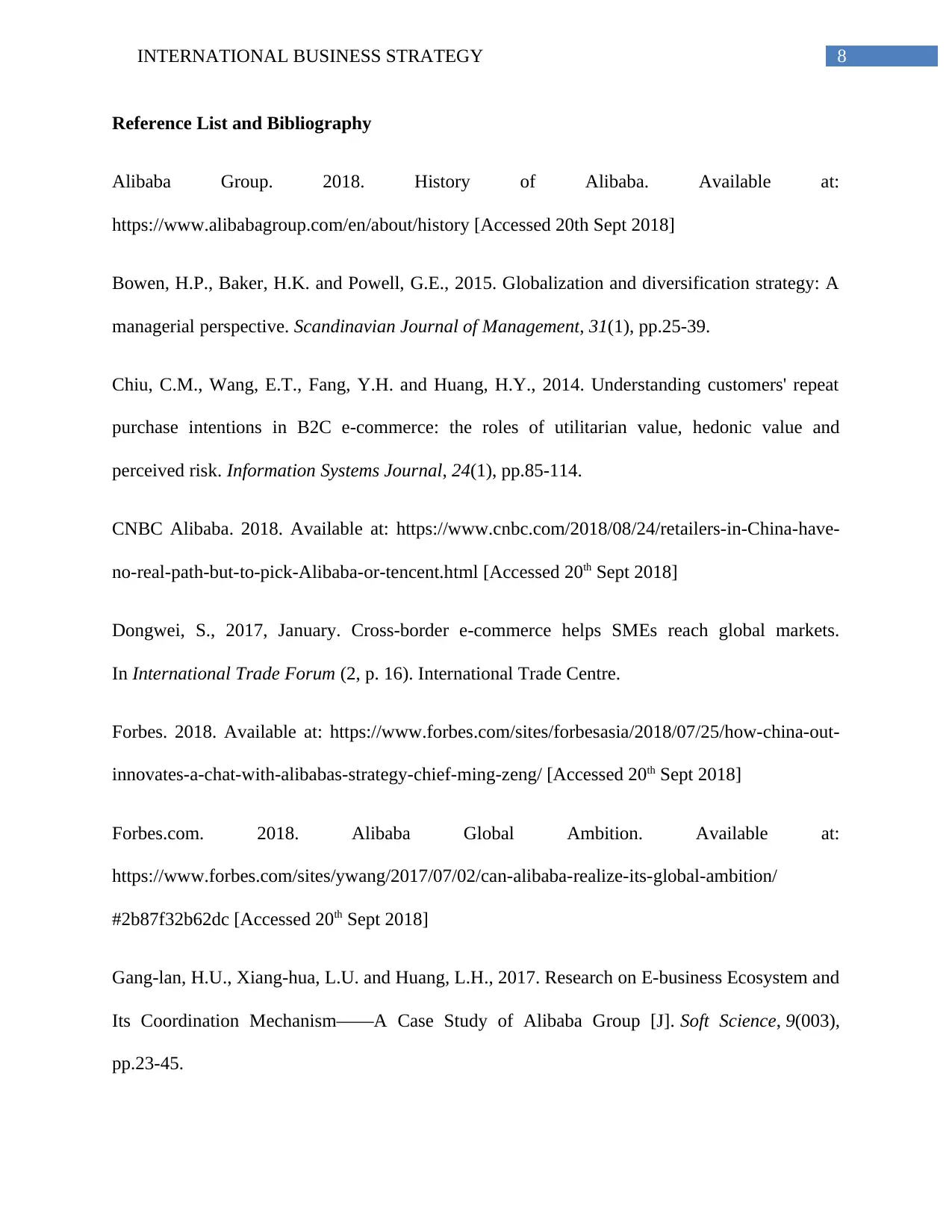
8INTERNATIONAL BUSINESS STRATEGY
Reference List and Bibliography
Alibaba Group. 2018. History of Alibaba. Available at:
https://www.alibabagroup.com/en/about/history [Accessed 20th Sept 2018]
Bowen, H.P., Baker, H.K. and Powell, G.E., 2015. Globalization and diversification strategy: A
managerial perspective. Scandinavian Journal of Management, 31(1), pp.25-39.
Chiu, C.M., Wang, E.T., Fang, Y.H. and Huang, H.Y., 2014. Understanding customers' repeat
purchase intentions in B2C e‐commerce: the roles of utilitarian value, hedonic value and
perceived risk. Information Systems Journal, 24(1), pp.85-114.
CNBC Alibaba. 2018. Available at: https://www.cnbc.com/2018/08/24/retailers-in-China-have-
no-real-path-but-to-pick-Alibaba-or-tencent.html [Accessed 20th Sept 2018]
Dongwei, S., 2017, January. Cross-border e-commerce helps SMEs reach global markets.
In International Trade Forum (2, p. 16). International Trade Centre.
Forbes. 2018. Available at: https://www.forbes.com/sites/forbesasia/2018/07/25/how-china-out-
innovates-a-chat-with-alibabas-strategy-chief-ming-zeng/ [Accessed 20th Sept 2018]
Forbes.com. 2018. Alibaba Global Ambition. Available at:
https://www.forbes.com/sites/ywang/2017/07/02/can-alibaba-realize-its-global-ambition/
#2b87f32b62dc [Accessed 20th Sept 2018]
Gang-lan, H.U., Xiang-hua, L.U. and Huang, L.H., 2017. Research on E-business Ecosystem and
Its Coordination Mechanism——A Case Study of Alibaba Group [J]. Soft Science, 9(003),
pp.23-45.
Reference List and Bibliography
Alibaba Group. 2018. History of Alibaba. Available at:
https://www.alibabagroup.com/en/about/history [Accessed 20th Sept 2018]
Bowen, H.P., Baker, H.K. and Powell, G.E., 2015. Globalization and diversification strategy: A
managerial perspective. Scandinavian Journal of Management, 31(1), pp.25-39.
Chiu, C.M., Wang, E.T., Fang, Y.H. and Huang, H.Y., 2014. Understanding customers' repeat
purchase intentions in B2C e‐commerce: the roles of utilitarian value, hedonic value and
perceived risk. Information Systems Journal, 24(1), pp.85-114.
CNBC Alibaba. 2018. Available at: https://www.cnbc.com/2018/08/24/retailers-in-China-have-
no-real-path-but-to-pick-Alibaba-or-tencent.html [Accessed 20th Sept 2018]
Dongwei, S., 2017, January. Cross-border e-commerce helps SMEs reach global markets.
In International Trade Forum (2, p. 16). International Trade Centre.
Forbes. 2018. Available at: https://www.forbes.com/sites/forbesasia/2018/07/25/how-china-out-
innovates-a-chat-with-alibabas-strategy-chief-ming-zeng/ [Accessed 20th Sept 2018]
Forbes.com. 2018. Alibaba Global Ambition. Available at:
https://www.forbes.com/sites/ywang/2017/07/02/can-alibaba-realize-its-global-ambition/
#2b87f32b62dc [Accessed 20th Sept 2018]
Gang-lan, H.U., Xiang-hua, L.U. and Huang, L.H., 2017. Research on E-business Ecosystem and
Its Coordination Mechanism——A Case Study of Alibaba Group [J]. Soft Science, 9(003),
pp.23-45.
⊘ This is a preview!⊘
Do you want full access?
Subscribe today to unlock all pages.

Trusted by 1+ million students worldwide
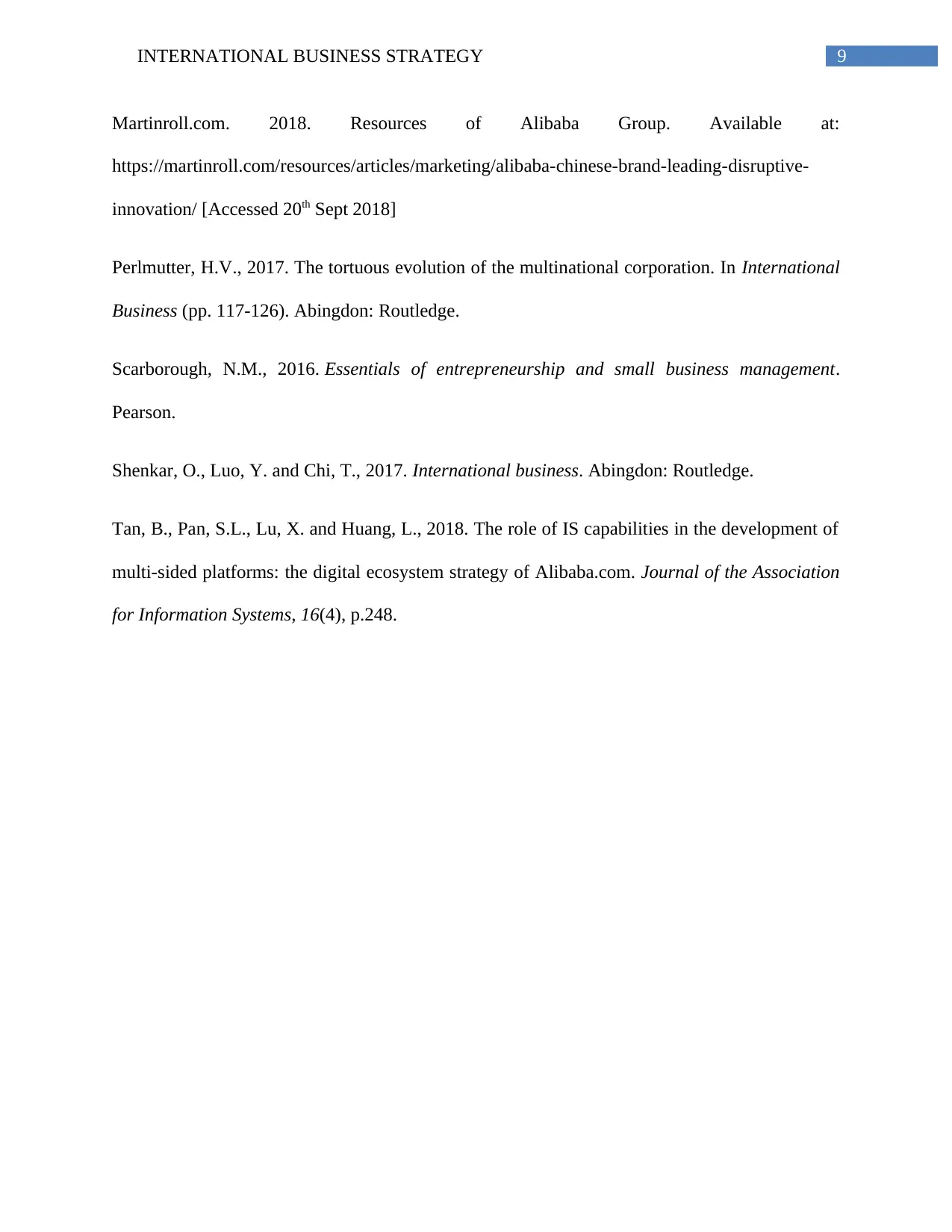
9INTERNATIONAL BUSINESS STRATEGY
Martinroll.com. 2018. Resources of Alibaba Group. Available at:
https://martinroll.com/resources/articles/marketing/alibaba-chinese-brand-leading-disruptive-
innovation/ [Accessed 20th Sept 2018]
Perlmutter, H.V., 2017. The tortuous evolution of the multinational corporation. In International
Business (pp. 117-126). Abingdon: Routledge.
Scarborough, N.M., 2016. Essentials of entrepreneurship and small business management.
Pearson.
Shenkar, O., Luo, Y. and Chi, T., 2017. International business. Abingdon: Routledge.
Tan, B., Pan, S.L., Lu, X. and Huang, L., 2018. The role of IS capabilities in the development of
multi-sided platforms: the digital ecosystem strategy of Alibaba.com. Journal of the Association
for Information Systems, 16(4), p.248.
Martinroll.com. 2018. Resources of Alibaba Group. Available at:
https://martinroll.com/resources/articles/marketing/alibaba-chinese-brand-leading-disruptive-
innovation/ [Accessed 20th Sept 2018]
Perlmutter, H.V., 2017. The tortuous evolution of the multinational corporation. In International
Business (pp. 117-126). Abingdon: Routledge.
Scarborough, N.M., 2016. Essentials of entrepreneurship and small business management.
Pearson.
Shenkar, O., Luo, Y. and Chi, T., 2017. International business. Abingdon: Routledge.
Tan, B., Pan, S.L., Lu, X. and Huang, L., 2018. The role of IS capabilities in the development of
multi-sided platforms: the digital ecosystem strategy of Alibaba.com. Journal of the Association
for Information Systems, 16(4), p.248.
Paraphrase This Document
Need a fresh take? Get an instant paraphrase of this document with our AI Paraphraser
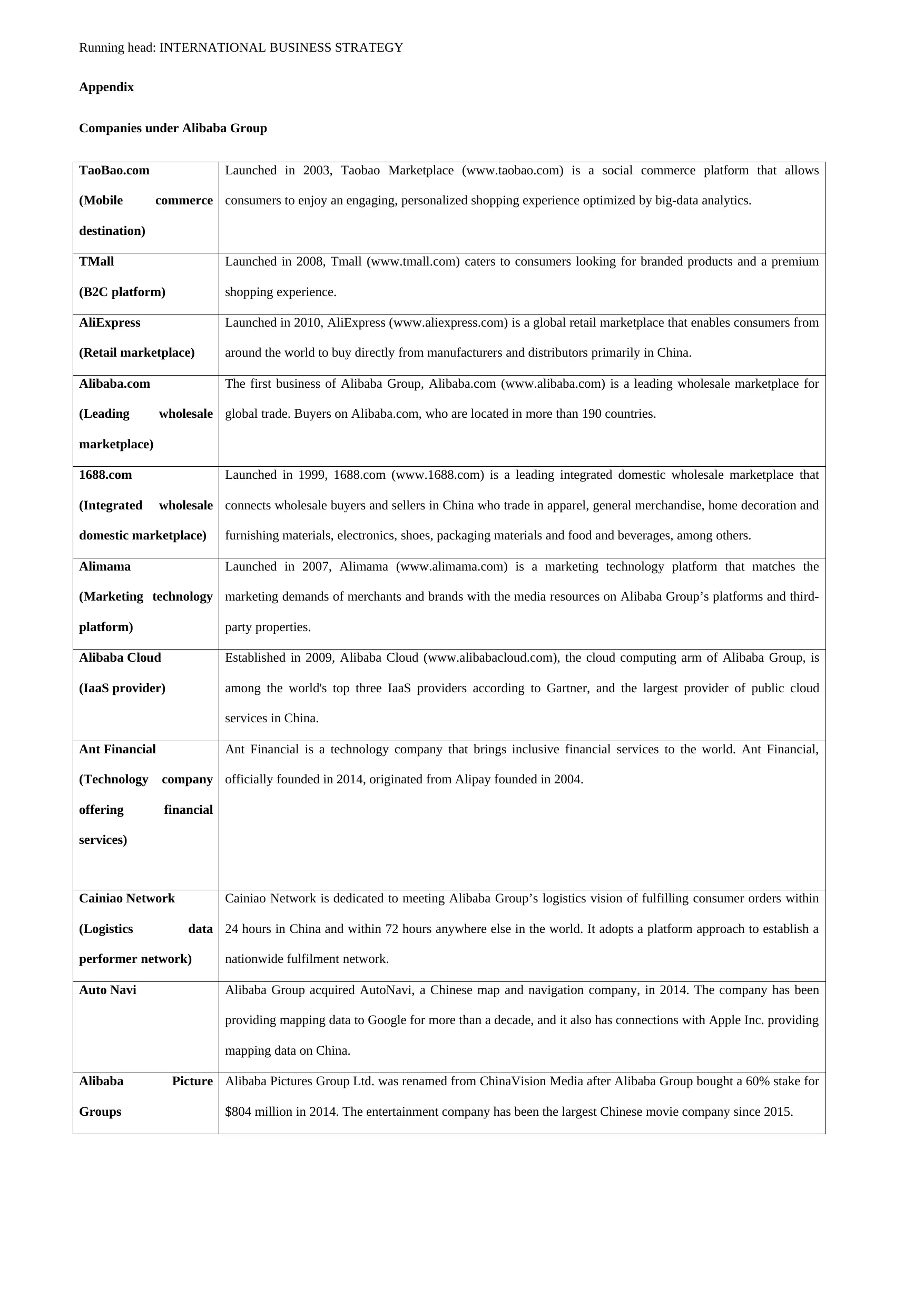
Running head: INTERNATIONAL BUSINESS STRATEGY
Appendix
Companies under Alibaba Group
TaoBao.com
(Mobile commerce
destination)
Launched in 2003, Taobao Marketplace (www.taobao.com) is a social commerce platform that allows
consumers to enjoy an engaging, personalized shopping experience optimized by big-data analytics.
TMall
(B2C platform)
Launched in 2008, Tmall (www.tmall.com) caters to consumers looking for branded products and a premium
shopping experience.
AliExpress
(Retail marketplace)
Launched in 2010, AliExpress (www.aliexpress.com) is a global retail marketplace that enables consumers from
around the world to buy directly from manufacturers and distributors primarily in China.
Alibaba.com
(Leading wholesale
marketplace)
The first business of Alibaba Group, Alibaba.com (www.alibaba.com) is a leading wholesale marketplace for
global trade. Buyers on Alibaba.com, who are located in more than 190 countries.
1688.com
(Integrated wholesale
domestic marketplace)
Launched in 1999, 1688.com (www.1688.com) is a leading integrated domestic wholesale marketplace that
connects wholesale buyers and sellers in China who trade in apparel, general merchandise, home decoration and
furnishing materials, electronics, shoes, packaging materials and food and beverages, among others.
Alimama
(Marketing technology
platform)
Launched in 2007, Alimama (www.alimama.com) is a marketing technology platform that matches the
marketing demands of merchants and brands with the media resources on Alibaba Group’s platforms and third-
party properties.
Alibaba Cloud
(IaaS provider)
Established in 2009, Alibaba Cloud (www.alibabacloud.com), the cloud computing arm of Alibaba Group, is
among the world's top three IaaS providers according to Gartner, and the largest provider of public cloud
services in China.
Ant Financial
(Technology company
offering financial
services)
Ant Financial is a technology company that brings inclusive financial services to the world. Ant Financial,
officially founded in 2014, originated from Alipay founded in 2004.
Cainiao Network
(Logistics data
performer network)
Cainiao Network is dedicated to meeting Alibaba Group’s logistics vision of fulfilling consumer orders within
24 hours in China and within 72 hours anywhere else in the world. It adopts a platform approach to establish a
nationwide fulfilment network.
Auto Navi Alibaba Group acquired AutoNavi, a Chinese map and navigation company, in 2014. The company has been
providing mapping data to Google for more than a decade, and it also has connections with Apple Inc. providing
mapping data on China.
Alibaba Picture
Groups
Alibaba Pictures Group Ltd. was renamed from ChinaVision Media after Alibaba Group bought a 60% stake for
$804 million in 2014. The entertainment company has been the largest Chinese movie company since 2015.
Appendix
Companies under Alibaba Group
TaoBao.com
(Mobile commerce
destination)
Launched in 2003, Taobao Marketplace (www.taobao.com) is a social commerce platform that allows
consumers to enjoy an engaging, personalized shopping experience optimized by big-data analytics.
TMall
(B2C platform)
Launched in 2008, Tmall (www.tmall.com) caters to consumers looking for branded products and a premium
shopping experience.
AliExpress
(Retail marketplace)
Launched in 2010, AliExpress (www.aliexpress.com) is a global retail marketplace that enables consumers from
around the world to buy directly from manufacturers and distributors primarily in China.
Alibaba.com
(Leading wholesale
marketplace)
The first business of Alibaba Group, Alibaba.com (www.alibaba.com) is a leading wholesale marketplace for
global trade. Buyers on Alibaba.com, who are located in more than 190 countries.
1688.com
(Integrated wholesale
domestic marketplace)
Launched in 1999, 1688.com (www.1688.com) is a leading integrated domestic wholesale marketplace that
connects wholesale buyers and sellers in China who trade in apparel, general merchandise, home decoration and
furnishing materials, electronics, shoes, packaging materials and food and beverages, among others.
Alimama
(Marketing technology
platform)
Launched in 2007, Alimama (www.alimama.com) is a marketing technology platform that matches the
marketing demands of merchants and brands with the media resources on Alibaba Group’s platforms and third-
party properties.
Alibaba Cloud
(IaaS provider)
Established in 2009, Alibaba Cloud (www.alibabacloud.com), the cloud computing arm of Alibaba Group, is
among the world's top three IaaS providers according to Gartner, and the largest provider of public cloud
services in China.
Ant Financial
(Technology company
offering financial
services)
Ant Financial is a technology company that brings inclusive financial services to the world. Ant Financial,
officially founded in 2014, originated from Alipay founded in 2004.
Cainiao Network
(Logistics data
performer network)
Cainiao Network is dedicated to meeting Alibaba Group’s logistics vision of fulfilling consumer orders within
24 hours in China and within 72 hours anywhere else in the world. It adopts a platform approach to establish a
nationwide fulfilment network.
Auto Navi Alibaba Group acquired AutoNavi, a Chinese map and navigation company, in 2014. The company has been
providing mapping data to Google for more than a decade, and it also has connections with Apple Inc. providing
mapping data on China.
Alibaba Picture
Groups
Alibaba Pictures Group Ltd. was renamed from ChinaVision Media after Alibaba Group bought a 60% stake for
$804 million in 2014. The entertainment company has been the largest Chinese movie company since 2015.
1 out of 11
Related Documents
Your All-in-One AI-Powered Toolkit for Academic Success.
+13062052269
info@desklib.com
Available 24*7 on WhatsApp / Email
![[object Object]](/_next/static/media/star-bottom.7253800d.svg)
Unlock your academic potential
Copyright © 2020–2025 A2Z Services. All Rights Reserved. Developed and managed by ZUCOL.





